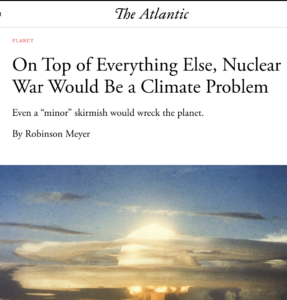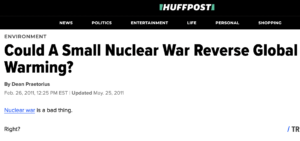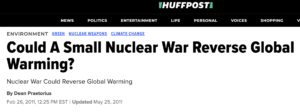This is the most Atlantic headline ever pic.twitter.com/FvwQwALbn6
— Jon Levine (@LevineJonathan) March 11, 2022
By Robinson Meyer – A staff writer at The Atlantic. He is the author of the newsletter The Weekly Planet, and a co-founder of the COVID Tracking Project at The Atlantic.
Excerpt: But energy is not the only domain that has a direct bearing on whether we have a livable climate or not. So does foreign policy—specifically, nuclear war.
Since Russia invaded Ukraine two weeks ago, that threat has become a lot more real: Many Americans, including artists, climate-concerned progressives, and even a few lawmakers, have come out in support of a “no-fly zone.” But despite its euphemistic name, a no-fly zone means that NATO and the United States issue a credible threat that they will shoot down any enemy plane in Ukrainian territory. This would require U.S. bombing runs into Russian territory to eliminate air defenses, bringing the U.S. and Russia into open war, and it would have a reasonable chance of prompting a nuclear exchange. And it would be worse for the climate than any energy policy that Donald Trump ever proposed.
I mean this quite literally. If you are worried about rapid, catastrophic changes to the planet’s climate, then you must be worried about nuclear war. That is because, on top of killing tens of millions of people, even a relatively “minor” exchange of nuclear weapons would wreck the planet’s climate in enormous and long-lasting ways.
Consider a one-megaton nuke, reportedly the size of a warhead on a modern Russian intercontinental ballistic missile. (Warheads on U.S. ICBMs can be even larger.) A detonation of a bomb that size would, within about a four-mile radius, produce winds equal to those in a Category 5 hurricane, immediately flattening buildings, knocking down power lines, and triggering gas leaks. Anyone within seven miles of the detonation would suffer third-degree burns, the kind that sear and blister flesh. These conditions—and note that I have left out the organ-destroying effects of radiation—would rapidly turn an eight-mile blast radius into a zone of total human misery. But only at this moment of the war do the climate consequences truly begin.
The hot, dry, hurricane-force winds would act like a supercharged version of California’s Santa Ana winds, which have triggered some of the state’s worst wildfires. Even in a small war, that would happen at dozens of places around the planet, igniting urban and wildland forest fires as large as small states. A 2007 study estimated that if 100 small nuclear weapons were detonated, a number equal to only 0.03 percent of the planet’s total arsenal, the number of “direct fatalities due to fire and smoke would be comparable to those worldwide in World War II.” Towering clouds would carry more than five megatons of soot and ash from these fires high into the atmosphere.
All this carbon would transform the climate, shielding it from the sun’s heat. Within months, the planet’s average temperature would fall by more than 2 degrees Fahrenheit; some amount of this cooling would persist for more than a decade. But far from reversing climate change, this cooling would be destabilizing. It would reduce global precipitation by about 10 percent, inducing global drought conditions. In parts of North America and Europe, the growing season would shorten by 10 to 20 days.
This would prompt a global food crisis the world hasn’t seen in modern times. Corn, wheat, and soybean yields would all decline by more than 11 percent over five years. In a slightly larger conflict—involving, say, 250 of the world’s 13,080 nuclear weapons—the oceans would become less bountiful; the photosynthesizing plankton that form the basis of the marine food chain would become 5 to 15 percent less productive. In the case of a U.S.-Russia war, fishers worldwide would see their catches decline by nearly 30 percent.
And even though the world would get cooler, the nuclear winter resulting from a full-blown global conflict (or even “nuclear fall,” as some researchers prefer) would not reverse the effect of what we might morbidly call “traditional” human-caused climate change. In the short term, the effects of ocean acidification would get worse, not better. The layer of smoke in the atmosphere would destroy as much as 75 percent of the ozone layer. That means that more UV radiation would slip through the planet’s atmosphere, causing a pandemic of skin cancer and other medical issues. It would affect not just humans, either—even on the remotest islands, the higher UV rates would imperil plants and animals otherwise untouched by the global carnage.
…
Outside of the direct effects of the bombs themselves, the full effect of a nuclear exchange could be even worse. If several years of gasoline- and diesel-fueled conventional military operations followed the global destruction, then the permanent consequences for the climate system would be even worse. That would also be true if society tried to rebuild by undertaking a fossil-powered reconstruction—and that would very likely be the case. The ruins of our postwar society would be poorer, and fossil reserves are the easiest energy sources to locate. Renewables, wind turbines, and other decarbonization technology, meanwhile, require secure factories, highly educated engineers, and complicated global networks of trade and exchange. They depend, in other words, on everything that peace provides. Solving climate change is a luxury of a planet at peace with itself.
#
Huffington Post 2011: Could A Small Nuclear War Reverse Global Warming? – “Nuclear War Could Reverse Global Warming” – Nuclear war is a bad thing. Right? …
The result, according to NASA climate models, could actually be global cooling. From National Geographic:
In NASA climate models, this carbon then absorbed solar heat and, like a hot-air balloon, quickly lofted even higher, where the soot would take much longer to clear from the sky.
In addition, the extreme weather caused by even a mild nuclear winter would have a tremendous effect on crops and famines, including creating a 10 percent global decrease in precipitation, according to National Geographic. The soot could also cause tremendous harm to the ozone layer, allowing more ultraviolet rays to reach Earth.
The cons seem to outweigh the pros in the event of global cooling caused by even a small nuclear war.






